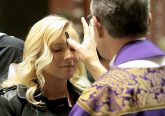Worship and Sacraments in the time of Public Health Concern
WORSHIP AND SACRAMENTS IN THE TIME OF PUBLIC HEALTH CONCERN Archdiocese of Cincinnati Revised 3/17/20
Per the decision to suspend public celebrations of all Masses/liturgies, below please find specific guidance on how best to proceed with celebrating the sacraments and allowing our sacred spaces to remain open for private prayer during this time. Please note separate sections for each sacrament, as well as specific and important guidance for administering the sacraments to any person who is a confirmed COVID-19 patient.
Keeping Church Buildings Open for Personal Devotion Our churches should remain open for private prayer of the faithful and for adoration of the Blessed Sacrament during a timeframe best determined by each pastor given constraints of staffing and the need to perform routine maintenance.
Eucharist Priests are highly encouraged to offer Mass daily, if possible, but in a non-public way. Consider the times a church or chapel is open for private prayer of the faithful, and celebrate the Eucharist at other times, or in a private chapel without members of the faithful, keeping in mind Canon 904: “Remembering always that in the mystery of the Eucharistic sacrifice the work of redemption is exercised continually, priests are to celebrate frequently; indeed, daily celebration is recommended earnestly since, even if the faithful cannot be present, it is the act of Christ and the Church in which priests fulfill their principal function.” Priests should not binate or trinate solely for the purpose of fulfilling scheduled Mass intentions; they can be rescheduled for the future.
During this time, Archbishop Schnurr has given permission for the Masses for Various Needs and Occasions, #45 “For the Sick” and #48 “In Any Need” to be used on Lenten weekdays.
Spiritual Communion via Live-Streamed Masses Following a live-streamed, online Mass viewing is an opportunity for the faithful to remain connected to the Sacrifice of the Mass during this difficult time. Please share with your people www.catholiccincinnati.org, or a livestream of your own parish’s non-public liturgy.
Baptism All parishes in the Archdiocese of Cincinnati are asked to observe some temporary practical norms concerning the Sacrament of Baptism. At this time, Baptisms are still
possible based on pastoral urgency. However, in order to limit any potential spread of the virus to a vulnerable population, only small, private family Baptisms with fewer than 50 attending are allowed. Use only fresh water that has been blessed for the Baptism and immediately drain it to the ground after. Family members in vulnerable populations as described in earlier guidelines should be encouraged to stay home.
Confession Especially during Lent, it is important that our people experience God’s mercy in the Sacrament of Reconciliation. Therefore, every consideration should be given to offering the Sacrament of Reconciliation to individuals. To help minimize the risk of exposure, we recommend considering the following actions should anyone be concerned about possible transmission of the Coronavirus/COVID-19: • Temporarily move out of the confessional if it is in a tight space and provide the Sacrament of Reconciliation in a larger room where a confidential conversation can still be held. • If possible, we recommend using a screen to block the air flow between the priest and penitent. The penitent should always have the option of confessing their sins anonymously. • Attempt to keep sufficient space between the priest and penitent. • We advise using a chair without armrests or cleansing the armrests with a sanitizer between each person. You may also consider providing this sacrament in such a way that the penitent remains standing so to ensure proper distance while minimizing the surfaces that are touched. • If you hear confessions from multiple penitents back-to-back, please ensure disinfecting wipes are available and used between each person’s confession. • As a reminder, the Sacrament of Penance may NOT be celebrated virtually (i.e. videochat, phone, etc.)
Confirmations All confirmations at least through April 12, 2020 are postponed. Pastors should contact Fr. Jason Williams ([email protected]), Master of Ceremonies to Archbishop Schnurr, to discuss options for rescheduling. Parishioners should direct questions to their pastors.
Weddings & Funerals At this time, weddings and funerals are still possible, but should be attended only by asymptomatic family members with fewer than 50 attending. If possible, parishes should work with couples to reschedule their wedding liturgies.
Ministering the Sacraments to non-COVID-19 patient
Holy Communion to the Sick and Homebound If the visit is in a hospital environment, follow the hospital directives regarding personal care (washing hands, etc.) • If the visit is in a home, follow the guidelines below o Wash hands or use a hand sanitizer once you enter the home o Avoid any physical contact with the person or family during the visit o Use a hand sanitizer again before distributing Communion o If the communicant usually receives Communion on the tongue, strongly encourage him or her, for your safety as well as his / hers, to receive Communion in the hand o Wash or sanitize your hands after the visit. • Maintain social distance (six feet) with everyone in the room, except the patient. • Do not offer comfort with any physical contact.
Anointing of the Sick If the sacrament is celebrated in a health care facility, follow the protocols and protective guidelines of that facility. • Maintain social distance with everyone in the room so as to offer comfort without making physical contact. • Wash or sanitize your hands once you enter the room. • The anointing may be done with a cotton-tipped swab or a cotton ball which is to be burned or buried after use. • If Holy Communion is given, it is to be distributed in the hand. • Sanitize your hands after the visit.
Ministering the Sacraments to confirmed COVID-19 patient
Priests in the high-risk group (i.e., over the age of 60) or those with comorbidity; i.e., when two or more chronic illnesses are present (e.g. hypertension, diabetes, Crohn’s disease, any cancers, rheumatoid arthritis, asthma, COPD, heart disease) should consider asking for the help of other priests when possible.
These recommendations are in place following the healthcare guidance that indicate younger, healthier individuals are at a much-diminished risk of contracting a serious case of COVID-19.
Anointing of the Sick • If this is performed in a hospital or healthcare facility, the guidelines for protective measures, including garments, prevail. • If this is not in a hospital or healthcare facility: If available, latex gloves should be worn unless the patient or priest has an allergic sensitivity to latex. Additionally, if available, protective eyewear (a pair of glasses will suffice) should be worn. • The anointing may be done with a cotton-tipped swab or a cotton ball which is to be burned or buried after use. • If this is performed in a hospital or healthcare facility, the guidelines for protective measures, including garments, prevail.
Holy Communion to the Sick and Homebound
• If this is performed in a hospital or healthcare facility, the guidelines for protective measures, including garments, prevail. • If this is not in a hospital or healthcare facility: If available, latex gloves should be worn unless the patient or priest/deacon has an allergic sensitivity to latex. Additionally, if available, protective eyewear (a pair of glasses will suffice) should be worn. • In all cases, follow the guidelines below. • Wash hands or use a hand sanitizer once you enter the home; • Avoid any physical contact with the person or family during the visit; • Use a hand sanitizer again before distributing Communion; • If the communicant usually receives Communion on the tongue, strongly encourage him or her, for your safety as well as his / hers, to receive Communion in the hand. • If the priest uses his gloved hand, the glove is to be burned or buried after the visit. • Maintain social distance (six feet) with everyone in the room, except the patient. • Do not offer comfort with any physical contact.
Please contact the Office for Divine Worship & Sacraments with any questions or concerns, [email protected].













